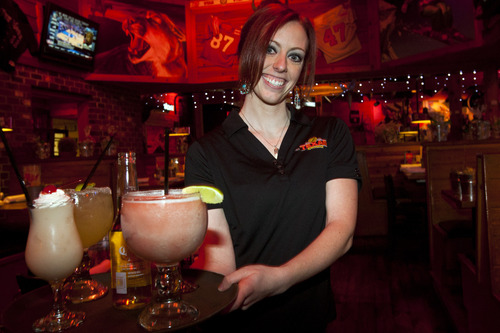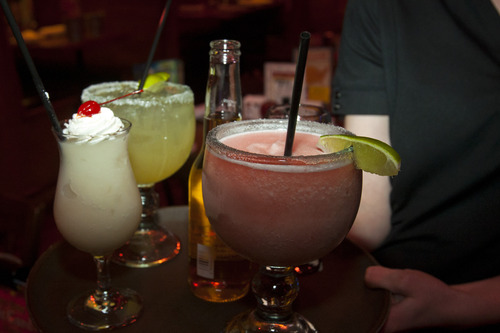This is an archived article that was published on sltrib.com in 2012, and information in the article may be outdated. It is provided only for personal research purposes and may not be reprinted.
Lawmakers are considering a bill that would allow restaurant chains to hold a single "master" liquor license for all locations rather than applying for a permit at each eatery.
The legislation would give chains that want to expand or come to Utah more flexibility in obtaining liquor permits, which have been in short supply, said the bill's sponsor, Sen. John Valentine, R-Orem.
"Restaurant chains cannot expand if they don't know if a license will be available," Valentine said before introducing the bill at a legislative interim committee hearing Wednesday. "This gives them predictability in making business decisions."
For the past several years, restaurant licenses — which are awarded based on the state's population — have become chronically scarce.
Buffalo Wild Wings, for instance, had to stop construction on locations earlier this year when no more licenses were available to accommodate multiple applicants. Even though lawmakers created 90 additional restaurant licenses in July to meet demand, some commercial developers say that without further legislative action, all available licenses could be snapped up by next spring.
Under existing law, each restaurant that wants to serve alcohol must have a liquor permit, tying up dozens of licenses and creating shortages, a problem lawmakers generally have been unwilling to remedy, citing concerns about drunk driving, underage drinking and overconsumption. More than 80 percent of legislators are members of The Church of Jesus Christ of Latter-day Saints, which teaches its members to refrain from drinking alcohol.
Utah's changing demographics, however, are putting pressure on the number of available permits. Drinkers in the state are downing nearly a third more liquor than they did six years ago, according to the Utah Department of Alcoholic Beverage Control. In addition, the population quota system for licenses does not recognize the millions of tourists who dine in Utah each year.
Although key lawmakers for years have tried to control consumption by restricting the number of alcohol licenses, the push for more economic development could help reshape that longtime policy.
Under Valentine's bill, chains could hold a single "master" license for full service, allowing all types of alcohol, or a single limited-service permit for beer and wine. For instance, Texas Roadhouse would have a license for all of its Utah locations, rather than the nine separate liquor permits that it holds.
The proposal would empower liquor-control commissioners to work out rules governing the master licenses for chains owning two or more locations. But penalties for eateries violating Utah liquor laws, such as serving alcohol to minors, would remain essentially the same, including fines and suspension of liquor service.
Individual servers who break the law would be held accountable, as would each restaurant. Valentine said enforcers also could penalize the entire restaurant chain if patterns of abuse were detected on the corporate level.
Melva Sine, president of the Utah Restaurant Association, spoke in favor of the bill, citing its potential benefits to economic development. She told the Business and Labor Interim Committee that alcohol consumption is not a public safety issue in restaurants, where diners must order food before they can imbibe.
The bill, however, does not address creating club or bar licenses, which are in such short supply that 19 applicants are vying for a single permit expected to become available later this month.
Fine-dining restaurants, such as Ruth's Chris Steak House and the New Yorker, hold so-called dining club permits, which do not share restrictions that are placed on restaurants. For instance, restaurants must erect barriers to hide bartenders and open bottles of alcohol from public view, and they may not have areas where only drinks are served while diners wait for tables. Minors are allowed, but they must be accompanied by an adult.
The second type of permit not included in the proposed bill is that of a social club license, which is equivalent to a public bar, where minors are not permitted on the premises and drinks may be served without an order for food.
Valentine said he did not include club permits in the master license for restaurant chains because there's much more pressure for eatery permits rather than for bar permits. He also said "there is little political will" to ease restrictions on club or bar licenses.
Twitter@DawnHouseTrib —
Proposed liquor bill
Under existing laws, restaurant chains must obtain an alcohol permit for each location. Options that will be considered include:
Full-service master license • A chain would apply for a single permit, allowing all types of alcohol at each of its eateries
Limited-service master license • Chains would apply for a single permit to serve wine and beer at all locations
Fine-dining and bar licenses • These are not covered in the bill. Nineteen applicants are vying this month for a single available permit.





